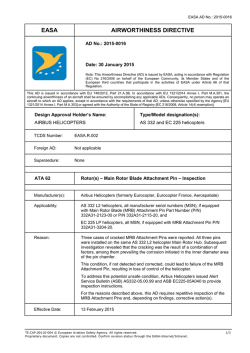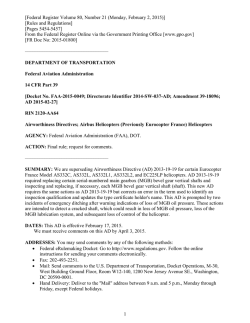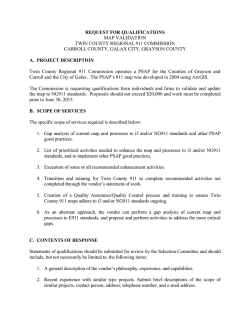
AIN February 2015 New Rotorcraft (688K)
NEW ROTORCRAFT SPECIAL REPORT The civil market continues to slow, but OEMs look to the future Piston Singles Enstrom TH180 Enstrom planned to fly its new twoseat piston-powered trainer last month. The company is using the common type certificate held by all its other models to speed the TH180’s development. Powered by the naturally aspirated Lycoming IO-390, the two-seat TH180 is expected to be able to use unleaded aviation fuels–when they are approved for the engine–and deliver relatively lower direct operating costs on fuel burns of less than 12 gallons per hour. The TH180 is designed to compete with the Robinson by Thierry Dubois and Mark Huber Aviation Manufacturers Association (GAMA) for the first nine months of 2014 were down 32.4 percent compared with the same period a year earlier. “It was brutal all over,” one OEM spokesman said of 2014 sales. Perhaps more interesting is to see what is selling the best in this down market: legacy products. AW’s best-seller remains the AW139 medium twin; at Airbus it’s the AS350B3e and EC130 singles and the EC135 light twin; at Bell it’s the 407 heavy single and 429 light twin. Industry billings for the first nine months of last year dropped more than 20 percent compared with the same period in 2013, according to GAMA. And it could be worse if not for a combination of some heavy discounting and cost containment going on, reflected in lower margins at both Airbus and United Technologies’ (UTC) Sikorsky, with the former posting a thin profit margin of just 6.4 percent, down half a point from 2013. The latter’s margins have dipped below 10 percent for the first time in recent memory, rekindling speculation that UTC is getting ready to cut it loose. New UTC CEO Greg Hayes gave stock analysts a mixed message in December, telling them, “We’re not going to sell Sikorsky…but the fact is, we’re going to take a hard look at the portfolio [of UTC companies] and do what’s right.” For Sikorsky and for other OEMs, “doing what’s right” in the short-term for the civil market could involve lowering expectations, slowing new programs in progress, shelving more long-term ambitions until the world energy demand and markets stabilize and/or recover, taking on more partners and even looking at consolidation down the road. Meanwhile, do not be surprised if some schedule adjustments are announced before or at Heli-Expo in March as eroding oil prices send a chill through the new helicopter market. 52 Aviation International News • February 2015 • www.ainonline.com Turbine Singles Bell 505 Jet Ranger X Bell announced its five-seat Short Light Single (SLS) at the 2013 Paris Air Show and later christened it the 505 Jet Ranger X. The aircraft first flew on November 14 last year and has already logged substantial orders; certification is expected late this year or early next. Performance goals for the 505 include a speed of 125 knots, a range of 360 to 420 nm, a useful load of 1,500 pounds Enstrom TH180 BARRY AMBROSE I n early January oil traded below $50 per barrel for the first time since 2009 and the U.S. dollar was wiping the floor with most of the competitive currencies around the globe. Just one month earlier, most industry analysts were putting a brave face on all of this relative to its impact on the world civil helicopter market, while the OEMs themselves remained sanguine or speechless or a little of both. The euphoria surrounding the new helicopter market a year ago has degraded to nervous optimism amidst the discovery of coughing canaries in the coal mine. The party might not be over, but the attendees are nursing their cocktails and speaking more softly. And nobody is dancing. About the time helicopter lessor Milestone Aviation was being acquired by Gecas last October, Bell was acknowledging that the first flight of its new super-medium 525 twin would be delayed into 2015. Meanwhile, much of the forward number-crunching related to the assumed price of oil is out the window, as could be the helicopter services demand forecasts by the offshore energy industry. Fortunately, many new deep-water projects are still profitable at $50 per barrel, but not much less than that. Unfortunately, a good bit of that activity is off the Brazilian coast and controlled by majority state-owned Petrobras, already the world’s most indebted oil company ($139 billion) and currently mired in a multibillion-dollar corruption scandal. Petrobras’s murky finances could limit its access to needed global capital for further exploration, while it continues to struggle to meet production targets. Overall, recent sales numbers already are declining. New civil helicopter sales collectively attributed to AgustaWestland, Airbus, Bell, Enstrom and Robinson by the General R44 and the Sikorsky 300C, with a delivered price in the range of $400,000. Bell 505 Jet Ranger X Enstrom 480B-G Enstrom’s 480B five-seat light turbine single is now available with Garmin G1000H glass-panel avionics. The basic price for the 480B-G this year will be $1.415 million. The 480B-G was certified in July last year and the first customer delivery was made in October 2014. The G1000H system in the 480B features a stacked configuration that mimics the aircraft’s original instrument panel and allows the display screens to be equally accessible from both pilot positions. Marenco Swisshelicopter SKYe SH09 The Marenco Swisshelicopter SKYe SH09 performed its first two flights– in hover mode and totaling less than 40 minutes–in the fourth quarter of 2014. In Molis, Switzerland, the startup company has slated EASA certification of its Honeywell-powered single for late this year. With a 5,842-pound mtow, it is designed to carry one pilot and seven passengers, which positions it at the higher end of the single-engine helicopter market. Marenco says it has received orders for more than 50 copies of the SKYe since its unveiling in 2011. At the time, the first flight was pegged for 2012. The composite construction enables, for a given weight, a higher level of performance and a greater cabin volume, according to Marenco. The SH09’s list price is $3 million, which includes basic avionics and two sliding doors. Preliminary data indicate 140 knots high cruise speed, 430 nm range and five hours endurance. Robinson R66 Turbine Marine Robinson Helicopter is making its R66 turbine single available with pop-out floats similar to those on the piston-powered R44 Clipper. The floats add approximately 65 pounds to the helicopter’s empty weight, are activated by a lever on the pilot’s collective, inflate within two to three seconds, and allow a swift water landing if necessary. The R66 Turbine Marine is also approved for water takeoffs at reduced operating weights, allowing for water operations training or limited amphibious use. The base price for the Robinson R66 Turbine Marine is $875,000. Scott’s-Bell 47, Model 47GT-6 Scott’s acquired the Model 47 type certificate from Bell in 2009 and announced its intention to put the iconic ship back into new production with a Rolls-Royce RR300 engine in 2013. It took delivery of its first test engine last year and expects to make deliveries of the new, $820,000 Model 47-GT6 next year at an eventual production rate of two per month. The GT6 will be based on the 47G-3B-2A widebody design (3,200-pound max gross weight with external load, 1,400-pound internal useful load, and external load 1,650 pounds). It features a host of modern upgrades beyond the Rolls-Royce engine (300 shp for five minutes, 240 shp maximum continuous) that will enable the helicopter to hover in and out of ground effect at better than 12,000 feet at 2,750 pounds on a standard day and post direct operating costs of less than $400 per hour. The GT6 is being fitted with an upgraded interior, LED lighting, new composite main rotor blades and a new drivetrain. The GT6 will feature Sagem digital avionics glass panel displays, including primary flight display (PFD) and engine monitoring system, split map/engine screen mode, display of an externally mounted camera, and VGA inputs and custom user databases such as display points for the moving map. The system will feature backup flight instruments and will also function as an engine indication and crew alerting system (Eicas) with a multifunction display (MFD) for items such as pilot checklists. A variety of options will be available, among them interfaces to GPS and transponders. Scott’s is offering three levels of warranty for the 47GT6: two years/2,000 hours, pro-rated after the first 200 hours; two years/1,000 hours, non-prorated; and three years/500 hours, non-prorated. The warranty on spare parts will be for one year/1,000 hours, pro-rated after the first 200 hours. Enstrom 480B-G Marenco Swisshelicopter SKYe SH09 Robinson R66 Turbine Marine Twins Airbus Helicopters EC135 T3/P3 The first Airbus Helicopters 6,560-pound-mtow EC135T3 light twin was delivered to Italy-based Aiut Alpin Dolomites shortly after EASA certification, in October. What looks, technically, like a minor set of modifications yields a major boost in performance, especially in critical conditions. As a result, mountain operators can expect a valuable reserve of power when at altitude with a full team of rescuers and one or two victims. The Turbomeca Arrius 2B2 Plus features new Fadec software and new air intakes that reduce so-called installation losses. The main rotor blades have been lengthened by four inches and the empennage has been shrunk. All this boosts the payload by 440 pounds in hot-and-high conditions. The EC135P3, powered by Pratt & Whitney Canada PW206B3s, is slated Continues on next page u Scott’s Bell 47GT-6 THIERRY DUBOIS and a ceiling of 11,000 feet. Power will come from a Fadec Turbomeca Arrius 2R (rated at 450 to 550 shp), and Garmin will provide the G1000H glasspanel avionics. The 505 also features a fully flat-floor cabin and rear clamshell loading doors for cargo or medevac. Bell is adapting proven drivetrain elements from the 206L4 LongRanger to contain costs. The 505 will be certified initially by Transport Canada, and production models will then be built at a new Bell facility in Lafayette, La. A price has not yet been set, but Bell CEO John Garrison told AIN last year that hitting near a $1 million price was viewed as critical to the 505’s market success and achieving that number hinged on Bell’s success in applying cost pressure on its suppliers. “We’re using suppliers’ capabilities to get to the price point. The 505 is designed to cost this much. The price elasticity is very clear,” he said. Airbus Helicopters EC135T3/P3 www.ainonline.com • February 2015 • Aviation International News 53 NEW ROTORCRAFT uContinued from preceding page Bell 429WLG for certification in this year’s first quarter. Retrofits are offered for in-service EC135P2/T2s. jack sykes Avicopter AC3X2 At the Zhuhai airshow, Avicopter exhibited a full-size mockup of a new helicopter, the AC3X2, targeted at EMS, law enforcement and offshore oil-and-gas operations. The aircraft is understood to be at the detailed design stage. The manufacturer is considering applying for FAA certification since it believes the AC3X2 may have a competitive edge in price on the global market. The intellectual property behind the helicopter is entirely domestic, a company representative emphasized. Airbus Helicopters EC145T2 Russian Helicopters Ka-226T Bell 429WLG (wheeled landing gear) Bell received certification for the retractable wheeled landing gear variant of its 429 light twin last year. The WLG option adds 250 pounds and nearly $400,000 to the price of a new 429 but gives the helicopter a five-knot speed advantage over a 429 with skids. Bell expects the wheeled variant to boost the type’s appeal to corporate and private customers who need to taxi or maneuver in tight spaces on the ground. Bell expects the wheeled variant to boost the type’s appeal to corporate and private customers who need to taxi or maneuver in tight spaces on the ground. Airbus Helicopters EC145T2 Russian Helicopters Ka-226T Russian Helicopters did not answer AIN’s repeated requests for an update. The certification schedule has moved many times over the years and the status of the program is thus uncertain. Last year Russian Helicopters said it is reassessing four programs, including this 7,900pound light twin. Russian Helicopters Ansat In December Russian Helicopters announced that its redeveloped Ansat light twin received Russian certification for passenger transport operations, although it was previously understood that the 2013 certification already included this capability. The Ansat passenger variant has an upgraded stability augmentation system. As certified earlier, it uses conventional flight controls in lieu of the original fly-by-wire controls. The 7,900-pound-mtow helicopter is powered by two Pratt & Whitney Canada PW207Ks and can carry eight passengers at a cruise speed of 119 knots. AgustaWestland AW169 AgustaWestland announced the 4.5-ton-class AW169 medium twin in 2010. Designed for singlepilot IFR operations, the eightto 10-passenger helicopter first flew in May 2012 and is slated for certification later this year. AgustaWestland holds orders for more than 100 copies of the $10to $12 million AW169 and anticipates a market for 1,000 over the next 20 years. The helicopter will be produced at AgustaWestland’s main plant in Vergiate and at AgustaWestland Philadelphia, with major components VLADIMIR KARNOZOV AgustaWestland AW169 Airbus Helicopters on July 31 delivered the first EC145T2 light twin to air rescue operator DRF Luftrettung at the manufacturer’s factory in Donauwörth, Germany. Airbus Helicopters says it has orders for more than 100 copies of the upgraded version of the EC145. The helicopter has been well received for police, corporate transportation and offshore oil-and-gas support operations. The enhanced, 8,047-poundmtow EC145 features a shrouded Fenestron tail rotor, improved engines and new avionics. The Helionix suite also equips the recently certified EC175 and the four-axis autopilot is included as standard. The Turbomeca Arriel 2E turboshaft is more powerful, at 894 shp, and has Fadec. Russian Helicopters Ansat 54 Aviation International News • February 2015 • www.ainonline.com Russian Helicopters Ka-62 manufactured at the company’s facility in Yeovil, UK. Approximately 30 percent of all orders to date are from North and South America. The AW169 is intended to compete with the S-76D and uses a variant of the same Pratt & Whitney Canada Fadeccontrolled PW210-series engines (1,000 shp each) that power the Sikorsky. The AW169 features a Rockwell Collins large threescreen glass-panel avionics system that includes dual FMS; a 222cu-ft flat-floor cabin; a 45-cu-ft baggage hold; and low noise signature. It is expected to offer good high/hot performance. The cabin is large enough to accommodate transverse-loaded stretchers. AgustaWestland plans to offer military, search-and-rescue, EMS, offshore and corporate variants. Airbus Helicopters AS365N3e In a surprise move, Airbus Helicopters terminated the 10,000-pound-class AS365N3e upgrade program for the Dauphin last year. “We’d rather focus on short delivery lead times and competitive prices for the AS365N3+ and EC155B1–the current Dauphin models–and the development of the X4,” a spokesperson told AIN. A protracted program, the N3e was to be certified by year-end, an Airbus Helicopters official had said in January 2014. Demonstration flights with prospective customers had begun. The medium twin was to get an upgraded rotor head and reinforced main gearbox, cutting direct maintenance costs by 10 percent and helping with handling the increased power from the Turbomeca Arriel 2Ns. Airbus is carrying on with the military version, the AS565 MBe Panther, the first delivery of which is planned for 2017. Airbus Helicopters X4 In December the X4 prototype achieved “power on,” which involved a number of systems but not the engines. Speaking at an investor forum in London, CEO Guillaume Faury also confirmed the Dauphin successor will be unveiled at Heli-Expo next month and fly this year. The X4, destined to replace the AS365/EC155 Dauphin series, will compete in the 9,000to 12,000-pound category. It will feature fly-by-wire controls and the house-developed Helionix avionics suite (in service on other types), rather than the previously envisioned, radically new manmachine interface. Customers will choose between two 1,100-shp engine options: the Turbomeca BARRY AMBROSE Bell 525 AgustaWestland AW189 TM800 and the Pratt & Whitney Canada PW210. Russian Helicopters Ka-62 Russian Helicopters did not answer AIN’s repeated requests for an update. The certification schedule has moved many times over the years and the status of the program, which has not yet reached first flight, is thus uncertain. In 2014, Russian Helicopters said it is reassessing four programs, including this 14,300-pound medium twin. AgustaWestland AW189 AgustaWestland gained EASA approval for its new AW189 medium twin on February 7 last year; FAA approval remains pending but is expected shortly. More than 130 AW189s have been sold, in addition to a major order announced last month for 160 over the next 10 years to Russian oil company Rosneft; those helicopters will be assembled at the HeliVert joint venture at Tomilino, Moscow. The AW189 is being marketed as a lower-cost alternative to the Sikorsky S-92A and Eurocopter EC225. With 12 passengers, the 17,900-pound (mtow) AW189 has the range to reach and return from energy platforms as far as 200 nm offshore. In high-density configuration, the AW189 can transport 18 passengers. The manufacturer is offering the AW189 in offshore, private, maritime search-and-rescue and parapublic variants. The AW189 is expected to be certified with a variety of options and kits and approved for single-pilot IFR. Power comes from a pair of 2,000-shp, Fadec-controlled GE CT7-2E1 turboshafts. The helicopter has a Rockwell Collins glass-panel avionics suite that is NVG-compatible, a four-axis autopilot and optional rotor ice-protection system. Airbus Helicopters EC175 Airbus Helicopters delivered the first two EC175s to NHV last December and one of them entered North Sea service the following week–nine years after the program was formally launched, five years after the EC175 first flew and 10 months after type certification. Designed with the oil-and-gas market in mind, the 16,500-pound EC175 is seen as a gap filler between the AS365/EC155 Dauphin and Super Puma. Russian and U.S. certifications are expected early next year. The firm order backlog covers close to 40 EC175s. The Chinese parts (fuselage, tailboom, intermediate gearbox and tail gearbox) are now said to be available on time and on specs, although some delays did emanate from partner Avicopter. Another impediment was the development of the housedesigned Helionix avionics suite. Avicopter AC352 Avicopter is developing the AC352, the Chinese counterpart of the Eurocopter EC175. The two airframers have shared the program 50-50 (see above). However, the certification effort, customer support networks and marketing areas are distinct. The status of the AC352 program is largely unknown, except for the engine. The Turbomeca/ Avic Engine Ardiden 3C/WZ16 made its first run at the French firm’s test facility in Bordes, southwest France, late in 2013. Chinese certification of the 1,800-shp turboshaft is expected in September. The AC352 has yet to fly and the program is understood to be targeting certification in 2017. Bell 525 Relentless Bell announced its most ambitious civil helicopter program at Heli-Expo 2012 and has begun assembly of the first prototype for first flight early this year. In late 2014 the company completed power-on testing of the 525’s avionics. The 525 Relentless is a 19,300-pound (max takeoff weight/7,400 pounds useful load) machine with an expected range of more than 500 nm (six passengers/two crew), a speed of better than 155 knots and a ceiling of 20,000 feet, aiming it squarely at the oil-and-gas market. However, Bell plans to offer SAR, law enforcement, medevac, VIP and executive variants as well. The helicopter will be powered by a pair of GE CT7-2F1s (1,800 shp each) driving an all-composite five-blade main rotor and a fourblade tail rotor. The aircraft will incorporate a triple-redundant fly-by-wire flight control system with a BAE flight computer that incorporates lessons learned on the Bell/Boeing V-22 and AW609 (formerly Bell/Agusta 609) tilt rotors. The 525 will feature the Garmin G5000H touchscreencontrolled glass panel integrated avionics suite with four main displays and Telligence voicecommand capabilities, two key components of Bell’s new ARC (awareness, reactive and control) Horizon cockpit. The ergonomic cockpit features pilot seats that J-track, pushing back and swiveling outward, for ease of egress. Right-hand, fly-by-wire sidesticks replace the conventional cyclics. The 525’s tailboom has been designed to provide less resistance and more lift for a higher hover out of ground effect altitude than conventional designs. Bell claims the boom’s aerodynamic shape will allow 88 more horsepower to be directed to the main rotors, compared with conventional designs, by directing downwash to provide countertorque. The five-blade main rotor is a commercial first for Bell, but its design is conventional. Entry to the 525’s 4.5-foot-tall cabin is through a pair of hinged doors located between the cockpit and the first row of four seating areas or through a pair of large aft sliding doors. Each seating area offers comfortable fourabreast seating for a total of 16 passengers or 20 in a five-abreast, high-density configuration. Airbus Helicopters EC225e The 25,000-pound-class EC225e, an upgrade from the in-service EC225, is in the flight-test phase. Notably thanks to more powerful Turbomeca Makila 2Bs, the upgraded medium twin will offer a 300-nm radius of action with 10 passengers. Airbus also promises a new cabin layout for improved passenger comfort and updated avionics. Certification of the EC225e is targeted for late this year, followed by the first delivery in the middle of next year. Lessor LCI is a launch customer. Airbus Helicopters EC175 AW609 Tiltrotor Russian Helicopters Mi-38 Russian Helicopters is proceeding with the development of the Mi-38 heavy twin, as the fourth prototype has recently made its maiden flight. It differs from the third prototype (which first flew in November 2013) in having a shock-resistant fuel system and larger windows. Klimov TV7-117V turboshafts–2,800 shp each at takeoff–power the 34,400pound rotorcraft, which has capacity for 30 passengers. The protracted program is now eying certification this year under Russian AP-29 standards. Tiltrotor/Compound AgustaWestland AW609 AgustaWestland is still aiming to certify the world’s first commercial tiltrotor in 2017. The aircraft will be certified initially by the FAA under Parts 23, 25, 29 and a new category called powered lift. Two more prototypes are scheduled to join the test fleet. AW successfully completed autorotation testing of the 609 last year. AgustaWestland is currently promoting four interior configurations for the aircraft, including a standard two-pilot, nine-passenger layout; a six- and seven-passenger executive cabin; a two-litter medevac interior; a search-andrescue design that includes hoist, basket, litter and four single seats; and a patrol/surveillance variant. A new flush opening cabin door with a retractable hoist is being designed for later models. Much speculation remains as to pricing but sources close to the program think it will be less than $30 million in current dollars. Announced aircraft performance includes a maximum forward speed of 275 knots, a ceiling of 25,000 feet, a hover out of ground effect of 5,000 feet, hover in ground effect of 10,000 feet, and a useful load of 2,500 pounds. Short-takeoff capability will be added to the certification basis to increase the helicopter’s maximum takeoff weight to 18,000 pounds from 16,800 pounds. The extra weight could be used to boost fuel capacity and range, now estimated at 700 nm. The AW609 will be assembled in Europe and the U.S. AgustaWestland CTR AW is developing a larger commercial tiltrotor expected to seat 25 to 50 passengers. It is partially funded by the European Union’s Clean Sky 2 environmental initiative and AW is currently recruiting risk-sharing partners. If the program progresses, the machine could fly in 2020 and enter production in 2025. o www.ainonline.com • February 2015 • Aviation International News 55
© Copyright 2026






